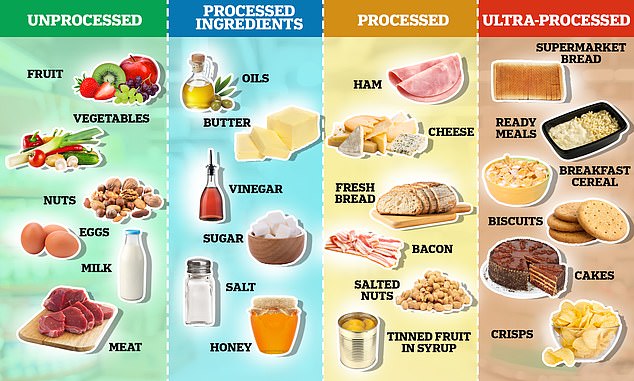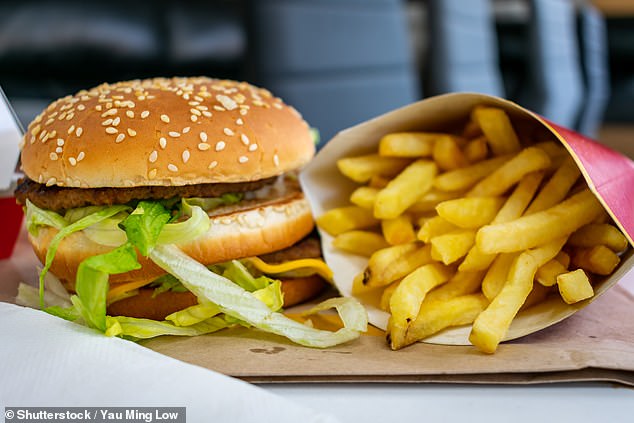Vegan fake meat is linked to an increase in cardiac deaths, study suggests: Experts say plant-based diets can boost health – but NOT if they’re ultra-processed
Replacing meat and dairy with plant-based swaps may not be the simple health hack you think it is.
Although eating fresh vegetables is linked to a lower risk of cardiovascular disease, you may want to rethink how many vegan burgers and pies you eat.
Scientists found that choosing ultra-processed plant-based products – such as vegan sausage burgers meant to replace animal foods, as well as cakes and chips – is linked to a 15 percent higher risk of heart attacks and strokes.
This is evident from an analysis of the diets of more than 118,000 participants in the UK Biobank study.
Ultra-processed foods, packed with fat, salt and loaded with sugar, have long been maligned for increasing the risk of heart attacks and strokes.
Although eating plant-based foods is associated with a lower risk of cardiovascular disease, you may want to rethink how many vegan burgers you eat, as researchers say UPF foods may increase the risk.
Research published in Lancet Regional Health – Europe shows that these dangers are even present in plant-based UPFs, with high consumption linked to a 15 percent increase in cardiac death.
The study, which involved experts from Imperial College London, used data from mMore than 118,000 Britons, aged 40 to 69, had their diet assessed for at least two days.
Scientists split food into plant products, such as fruits, vegetables, grains, bread, as well as pastries and sweets, and animal products such as fish, poultry, red meat, eggs and dairy.
The two groups were then further divided into ultra-processed (UPF) and non-ultra-processed.
These data were then linked to hospital and mortality data to obtain information on cardiovascular disease.

An easy sign that a food may be a UPF is if it contains ingredients you wouldn’t find in your kitchen cupboard, such as unrecognizable dyes, sweeteners and preservatives. Another clue is the amount of fat, salt and sugar contained in each package, with UPFs typically containing large amounts
People who ate a lot of plant-based, ultra-processed foods had a 7 percent greater risk of conditions such as clogged heart arteries and had a 15 percent increased risk of death compared to vegetarians whose diets contained less.
Increasing intake of non-processed vegetarian foods – such as fresh fruits and vegetables – by 10 percent was associated with an 8 percent lower risk of developing heart disease.
Deaths from heart disease fell by a fifth among vegetarians who consumed the fewest UPFs and by 13 percent among cardiovascular disease overall – caused by a buildup of fatty deposits in the arteries.
Dr. Study co-author Eszter Vamos, from Imperial College London’s School of Public Health, said: ‘Fresh plant foods such as fruit and vegetables, whole grains and legumes are known to have important health and environmental benefits.
‘Although ultra-processed foods are often marketed as healthy foods, this large study suggests that plant-based ultra-processed foods appear to have no protective health effects and are linked to poor health outcomes.’
Food additives and industrial contaminants present in these foods may cause oxidative stress and inflammation, the scientists suggest.
They added that dietary guidelines that promote plant-based diets and reducing meat should also emphasize the importance of avoiding UPFs for good heart health.

Ultra-processed foods, packed with fat, salt and loaded with sugar, have long been maligned for increasing the risk of heart attacks and strokes
Study author Dr. Fernanda Rauber, an expert in preventive medicine from the University of São Paulo in Brazil, said it is the first to show that plant-based, ultra-processed foods are associated with an increased risk of cardiovascular disease.
“Despite being plant-based, these foods may contribute to risk factors such as dyslipidemia and hypertension due to their composition and processing methods,” she said.
‘Food additives and industrial contaminants in these foods can cause oxidative stress and inflammation, further exacerbating the risks.
‘Therefore, our results support the shift towards plant-based food choices, taking into account the level of processing to improve cardiovascular health outcomes.’
But independent experts said it was crucial that the study’s findings were put into context.
They highlighted how research studies lumped all plant-based UPFs together, a process that included chips, cakes, candies and other fatty foods known to be bad for our heart health.
Professor Gunter Kuhnle, an expert in nutrition and food sciences at the University of Reading, said: ‘The results of the latest research into ultra-processed foods are not surprising, as ‘plant-based ultra-processed foods’ also include foods that are commonly known. have a negative effect on health: foods high in sugar, fat and salt.’
“The foods included include ‘pastries, rolls and cakes’, ‘confectionery’ and ‘soft drinks’ – and their impact on health was known before the concept of ultra-processing became popular,” he added.
‘This could cause confusion among general readers as it could be misinterpreted as plant-based alternatives to animal products, such as plant-based drinks or meat alternatives. However, these foods appear to make only a small contribution to the total intake of “UPF” in this study, Professor Kuhnle emphasizes.
He adds that it’s also “not surprising” that eating more minimally processed foods, such as fruits and vegetables, was positive for heart health.

The study categorizes all plant-based UPFs together, including chips, cakes, sweets and other fatty foods known to be bad for our heart health.
Dr. Duane Mellor, dietitian and spokesperson for the British Dietetic Association, also said the way the study was designed had to be taken into account.
‘It examined the effects of all plant-based, ultra-processed foods – although this included plant-based meat alternatives, these made up only 0.2 percent of the energy from ultra-processed foods consumed by participants monitored during the study,’ he says. said.
“The top foods considered plant-based, ultra-processed foods were processed baked foods, including packaged breads, pastries, cakes and cookies, along with chips and soft drinks,” he said.
Dr. Mellor added: ‘This study potentially highlights the problem that many foods that do not contain animal products, including biscuits, crisps, confectionery and soft drinks, are technically plant-based but would not be considered essential as part of a healthy diet . the majority of people.
‘So it’s important to emphasize that just because a food or drink is technically plant-based does not mean it is healthy.’
Dr. Hilda Mulrooney, a nutrition and health expert from London Metropolitan University, said the findings “will cause a stir.”
She said: ‘It’s an area well worth exploring; I don’t agree with the premise that something being “plant-based” is automatically healthy.
‘But I also don’t think that when people think of ‘plant-based’ they think of bread, cereal, etc. I can imagine that they are thinking more about alternatives to meat, fish and dairy products.’
She added: ‘While some may assume that the message of this study is that all ultra-processed plant foods are bad for health, I think the evidence in the study actually shows that poor diet is associated with increased risk. of chronic diseases.’
Dr. Mulrooney also believes there are limitations to the study.
She said: ‘The research is limited to demonstrating associations and causation cannot be proven. It also relies entirely on the NOVA classification system and a number of concerns have been raised about this – in particular that it assumes that the health effects of a food are based only on the extent of processing, and not on its nutritional value.
‘For example, breakfast cereals are classified as ultra-processed and should therefore be avoided according to the authors’ rationale, but we know from the NDNS in Britain that breakfast cereals make a significant contribution to the intake of several nutrients.’
UPFs are foods that have undergone various changes to extend their shelf life or make them more attractive to consumers, or sometimes both.
An easy sign that a food may be a UPF is if it contains ingredients you wouldn’t find in your kitchen cupboard, such as unrecognizable dyes, sweeteners and preservatives.
Another clue is the amount of fat, salt and sugar contained in each package, with UPFs typically containing large amounts.
